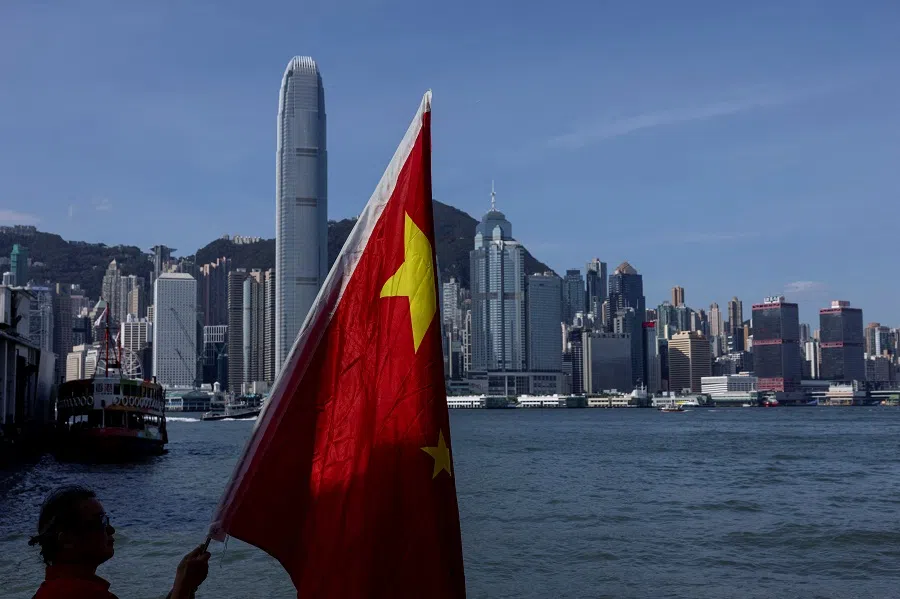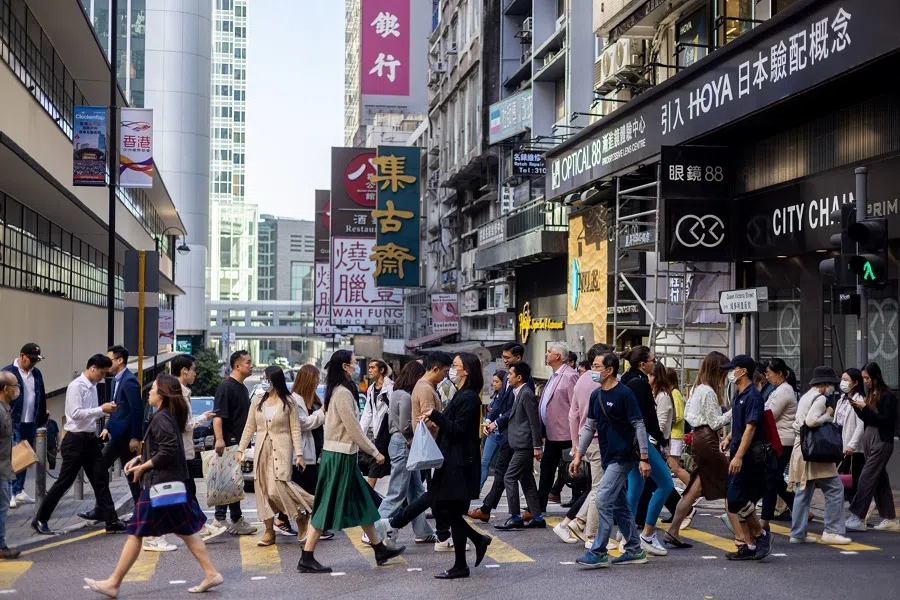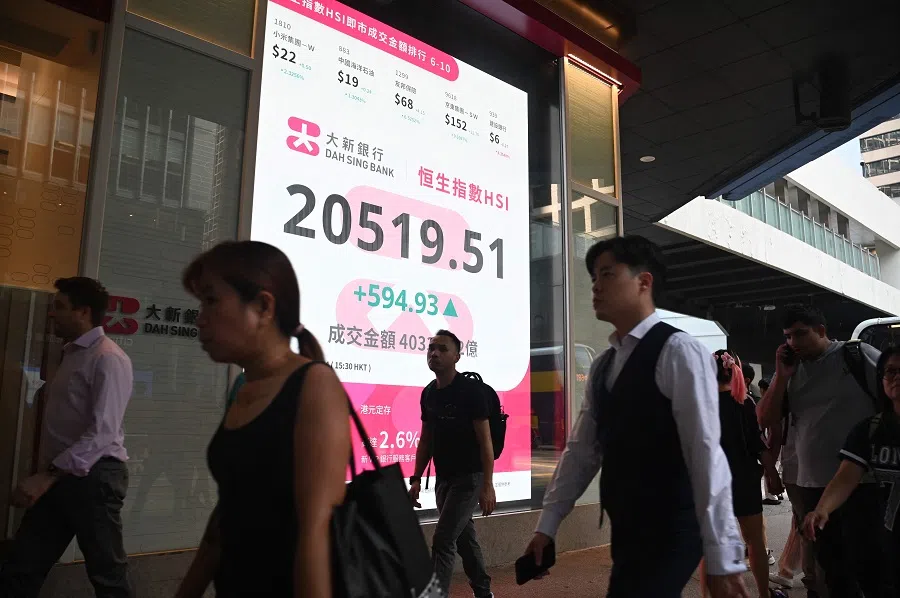How Hong Kong reclaimed its spot as Asia’s top financial centre
A US Congress bill threatens to curtail the privileges of Hong Kong’s trade offices in the US if they are not deemed to have a “high degree of autonomy” from Beijing. This could hurt Hong Kong’s economic attractiveness, but the special administrative region still has some fundamentals it can rely on, says EAI senior research fellow Yu Hong.

On 6 September 2024, the US Department of State, Department of the Treasury, Department of Commerce, Department of Agriculture and the Department of Homeland Security jointly issued an amendment to the July 2021 Business Advisory on Risks and Considerations for Businesses Operating in Hong Kong, including US export control and economic sanctions risks related to the Chinese mainland and Hong Kong.
In this joint notice, the US government identified a range of potential reputational, financial, regulatory and other risks associated with companies doing business in Hong Kong. The Biden administration has warned that the risks facing companies doing business in Hong Kong, include the possibility of violating expanding US sanctions.
As warned by the US authorities, while Hong Kong’s legal system differs from that of the Chinese mainland, its judiciary is increasingly influenced by Beijing. The Hong Kong national security law (NSL) has been criticised as being draconian, threatening the independent functioning of courts, and heaping pressure on the judiciary.
Following the implementation of the NSL, the US announced in 2020 that it would not recognise Hong Kong’s status as a separate customs territory, and the UK, Canada, Australia and some other countries have followed suit and successively suspended the relevant preferential tariff agreements with Hong Kong.
Questions over rule of law, democratic rights and autonomy
Ties between the US and Hong Kong have frayed over the city’s crackdown on dissent, which American officials have accused of eroding the city’s rule of law and democratic rights. Lord Sumption, a high-profile British judge who resigned from Hong Kong’s highest court recently, has warned that the city is “slowly becoming a totalitarian state” and judges are being compromised by an “impossible political environment created by China”. At least six senior foreign judges have stepped down from sitting in Hong Kong since the NSL was imposed by China in 2020.
Some foreign companies in Hong Kong have begun to lay off employees, reduce their business or even withdraw from Hong Kong. Foreign direct investment in the territory from the Western countries has also declined.

Worse still, Hong Kong’s half-century reign as the freest economy in the world has ended, according to the most recent rankings published by Fraser Institute, a Canadian think-tank, that cited eroding judicial independence as one factor. The Asian financial hub fell to second place in the Economic Freedom of the World Index for the first time since it began in 1970.
As the city’s relationship with the US deteriorates, there is an upward trend of foreign companies (primarily American firms) withdrawing from Hong Kong. Some foreign companies in Hong Kong have begun to lay off employees, reduce their business or even withdraw from Hong Kong. Foreign direct investment in the territory from the Western countries has also declined.
The bipartisan Hong Kong Economic and Trade Office Certification Act, which could lead to the closure of Hong Kong’s three trade offices in the country, was passed by the US House of Representatives in late September and must also clear the full Senate, the upper Congressional chamber, before it can be sent to President Joe Biden’s desk to be signed into law.
The bill requires the US secretary of state to review the city’s three American trade missions — in New York, San Francisco and Washington — and strip them of privileges if they are found to operate without a “high degree of autonomy” from China.
Many US Congress members who support the bill have previously questioned whether Hong Kong, following the enactment of the NSL in 2020, remains sufficiently autonomous to justify having its own representation separate from Beijing’s.
Hong Kong’s 14 Economic and Trade Offices overseas, overseen by the Commerce and Economic Development Bureau, carry out liaison and representational functions on trade and economic affairs, as well as works on telling “Hong Kong’s good story” overseas. Hong Kong Chief Executive John Lee has echoed Beijing’s warning that Washington might face “strong and resolute” retaliatory measures if the US Congress presses ahead with such a bill.
Hong Kong’s finance and external trade, which has long served as a bridge between the East and the West, will inevitably be impacted.
Hong Kong caught in the fray
The Hong Kong situation has been trapped in the crossfire of the ongoing power rivalry between China and the US. In the face of the double challenges of the China-US strategic competition and the slowdown in China’s economic growth, Hong Kong’s finance and external trade, which has long served as a bridge between the East and the West, will inevitably be impacted. Europe and the US are Hong Kong’s major trade and investment partners.

After falling by 7.9% in 2022, Hong Kong’s total trade in goods continued to decline by 6.7% to US$1,131 billion in 2023. Reflecting this decline, Hong Kong’s exports to the US in 2023 amounted to US$34.9bn, down 6.9% compared with 2022. Hong Kong handles a lot of offshore trade. Re-exports in 2023 amounted to US$527.1 billion, down 8.0% from 2022. While the number of global companies with regional headquarters in Hong Kong has fallen by some 8.4% since 2019, the number of staff engaged by such firms has dropped by 30% during the same period, according to the Hong Kong official data.
Hong Kong is one of the world’s most service-oriented economies, accounting for 93.4% of GDP in 2022. The possible closure of Hong Kong Economic and Trade Offices in America would inevitably further affect Hong Kong’s efforts to promote its image and raise concerns over its economy (in particular, finance and trade).
Taking the financial sector as an example, Hong Kong is an important banking and financial centre in the Asia-Pacific region. As an international financial centre, Hong Kong’s financial services industry has always been one of the most important economic pillars in Hong Kong, accounting for 23.4% of GDP in 2022 and providing about 276,200 jobs, representing 7.5% of total employment in the territory. Regarding Hong Kong’s external trade, as of December 2023, there were 166,362 import and export trading companies in Hong Kong, employing 657,754 people. In 2022, external trade accounted for 16.3% of Hong Kong’s GDP.
By the end of 2022, the number of Chinese enterprises regionally headquartered in Hong Kong had surpassed that of American firms with regional hubs in the city for the first time in at least three decades.
Hong Kong’s backing by the Chinese mainland and its connections to the wider world are unique advantages that no other international financial centre can match. China’s development has long been the most important factor affecting Hong Kong’s trade and economic development.
Wooing mainland firms
In the face of increasing geopolitical pressure from the West in general and the US in particular, and partly as a way to counter the economic impact of the gradual shift away from Hong Kong by the Western companies, the local authorities in Hong Kong have also been aggressively wooing Chinese mainland firms, selling the city as an increasingly important gateway to help them gain a share of the global market. By the end of 2022, the number of Chinese enterprises regionally headquartered in Hong Kong had surpassed that of American firms with regional hubs in the city for the first time in at least three decades.

Hong Kong is an important entrepot for the Chinese mainland. According to Hong Kong government statistics, in 2023, 45.8% of re-exported goods originated on the Chinese mainland, while 55.5% were sent to it. Moreover, the Chinese mainland is a major source of investment for Hong Kong. According to Hong Kong government statistics, the Chinese mainland’s stock of direct investment — the total value of all direct investment — in Hong Kong amounted to US$603.2 billion in market value at the end of 2022, accounting for 30.0% of all sources.
The latest Global Financial Centres Index (GFCI) released in September 2024 showed that Hong Kong has risen one place to third, surpassing Singapore for the first time in two and a half years. New York and London, respectively, continue to occupy first and second places. The GFCI is jointly released by the Z/Yen Group in London, UK, and the China (Shenzhen) Development Institute, and has been issued twice yearly, in March and September, since 2007.
Bringing new impetus to the local capital market
The deepening of Hong Kong’s financial linkages with mainland China has helped to reinforce Hong Kong’s status as an international financial centre. The China Securities Regulatory Commission announced several new measures to further support the development of Hong Kong’s financial market recently. These include encouraging leading Chinese mainland enterprises to list in Hong Kong, supporting the inclusion of RMB (Chinese currency) stock trading counters in Hong Kong Stock Connect and enhancing the MRF arrangement. These measures are conducive to bringing new growth impetus to the local capital market, and driving the development of related services such as accounting and law in Hong Kong.
Moreover, Hong Kong is actively strengthening and expanding its economic and trade relations with Southeast Asia, the Middle East and Latin America. Indeed, John Lee and other senior officials have been busy travelling to many fast-growing emerging countries since 2022, from Southeast Asia to the Middle East, to grab business opportunities and secure market access for the Hong Kong companies.
Hong Kong’s strengthening of its economic and trade ties with emerging markets, including Southeast Asian countries, will help consolidate its position as an international financial centre and gateway to the Chinese mainland.
In 2023, John Lee led an economic and trade delegation to Singapore, Indonesia and Malaysia. In July 2024, he led a delegation to Laos, Vietnam and Cambodia. He and other senior HK officials gave briefings on the latest developments and existing advantages of Hong Kong in seeking to strengthen Hong Kong’s ties with emerging market countries and gain new business opportunities for Hong Kong enterprises.

Moreover, Hong Kong is seeking to deepen ties with trading partners in Europe, with the city’s finance chief set to make his second post-pandemic trip to London after visiting Madrid with a delegation of tech industry leaders.
Still a credible financial centre and gateway to the mainland
Hong Kong’s strengthening of its economic and trade ties with emerging markets, including Southeast Asian countries, will help consolidate its position as an international financial centre and gateway to the Chinese mainland. According to official data, to the surprise of many, Hong Kong’s total trade in goods from January to July 2024 was worth US$684.9 billion, an increase of 10.9% compared to the same period in 2023.
Given its status as a world-class business metropolitan city with a vibrant culture scene, Hong Kong will remain an attractive place with Chinese characteristics for talent and capital from around the region and beyond.
... bringing in talented people will not help Hong Kong if the authorities do not address the high cost of living and lack of support for integration of new arrivals into local society.
Hong Kong has risen seven places to rank ninth in attracting and fostering talent, its highest standing since 2016, while Singapore remained the first among Asia-Pacific economies, according to a global study titled “World Talent Ranking” undertaken by The International Institute for Management Development, a Switzerland-based business school. Hong Kong’s overall ranking rose from 16th last year to 9th this year.
Hong Kong’s rise in the World Talent Ranking primarily came about because of improvements in three major assessment areas: investment and development, appeal, and readiness. Nevertheless, bringing in talented people will not help Hong Kong if the authorities do not address the high cost of living and lack of support for integration of new arrivals into local society.
In a nutshell, Hong Kong’s strength derives firstly from its market efficiency, simple and low taxation, free port and sound financial oversight. In addition, Hong Kong has long maintained its position based on free access to capital, absence of investment restrictions, and free and convenient connections with major financial markets and customers from all over the world.
As long as Hong Kong can maintain these strengths, as well as its status as the bridge between mainland China and the world, it can ensure the resilience and competitiveness of its economy and its position as an international financial centre and important trade hub.





